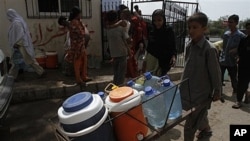Nearly 780 million people are deprived of safe drinking water -- and 2.5 billion lack access to improved sanitation -- all because governments aren't spending scarce resources wisely, according to a joint report of the World Health Organization and U.N.-Water.
Between 1990 and 2010, the agencies report, more than 2 billion people gained access to safe drinking water and 1.8 billion gained access to improved sanitation, while today billions more are still missing out on these basic services.
"Every year, there are two-million deaths caused by diarrheal diseases associated with this lack of safe water [and] sanitation," said Maria Neira, a WHO public health director, adding that access to these services depend on where and how governments invest in providing them. "Those two-million deaths occurring annually can be prevented."
The data, collected from 74 developing nations, show countries suffering from a chronic lack of technicians, skilled labor and staff to operate and maintain sanitation and drinking water infrastructure.
"If you imagine that you are in a village and you get your water from a hand pump, imagine if that hand pump is broken and everyone feels good that they have put this hand pump in, maybe months ago or maybe a year ago, but it simply does not work," said Bruce Gordon, the report's lead author. "In urban areas, it is the same situation -- only seven percent of aid goes to maintain existing services, [and] 30 percent of domestic financing by governments."
According to Gordon, it is likely those with access to potable water and sanitation won't have these services in the future.
The report says the total amount given in development aid for sanitation and drinking water increased by 3 percent -- to $7.8 billion -- from 2008 to 2010, but only half of that amount is allocated to regions where 70 percent of those lacking these services actually live: sub-Saharan Africa, Southern Asia and South-eastern Asia.
Gordon said the money donated by governments to developing countries is not enough. If the donations were properly targeted, he said, it would make a huge difference in terms of improving services.
News
UN: Clean Water, Sanitation Gains Slipping
- By Lisa Schlein




